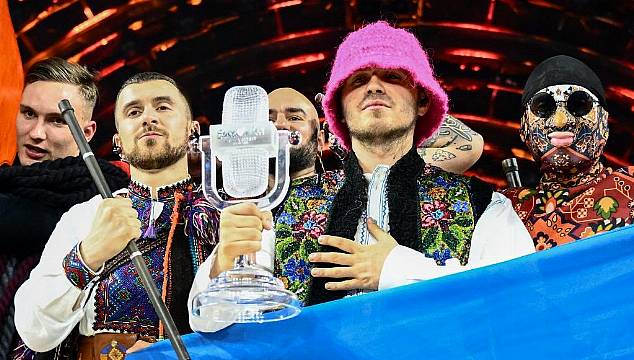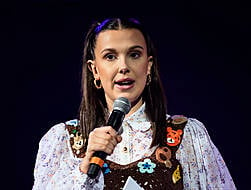The lead singer of Ukraine’s Kalush Orchestra has said the folk-rap group will celebrate the Eurovision Song Contest win “after the war”.
The act had been the frontrunner of the competition since the invasion, which prompted organisers to ban Russia from competing.
Following their win in Turin, Italy, following a powerful performance of the song Stefania, Kalush Orchestra said the victory was “for every Ukrainian”.
During a press conference, frontman Oleg Psyuk said: “We haven’t really celebrated yet.
“We will probably have a big celebration after the war because victory is great, winning Eurovision is fantastic but there is just so much stuff going on.
“People are getting killed in the war or they fight in the war or lose their jobs in Ukraine, it is not really the best backdrop for celebrations.”
Addressing the social media post from Ukrainian president Volodymyr Zelensky who said next year Ukraine will host Eurovision, Psyuk added: “If the president said it’s going to happen, then it’s going to happen.
“We will host Eurovision in a newly rebuilt and happy Ukraine.
“He congratulated us and he is happy we won.”
Psyuk said Ukraine’s Eurovision win “lifted” the war-torn nation’s spirits and he remains hopeful for the future of the country.
During the performance, which combined rap and Ukrainian folklore, the group members were dressed in elaborate outfits, including long multi-coloured fringed ensembles.
The rapper said: “I looked calm, but my heart just kept pounding.
“I mean, of course I was nervous, 200 million people watching, the whole of Ukraine watching us, a huge responsibility.
“You have no right to screw this up!”
Despite the triumph, Psyuk said he was going back to his home in Ukraine where he runs a volunteering organisation.
He added: “It is chaos.
“It’s like a sick lottery with all those missiles.
“I am going back to Ukraine, I run the volunteering organisation, we help people with accommodation, transportation, medication, whatever is needed so I am just going to keep doing that.”
The Ukrainian group was not leading the Eurovision score board after the jury vote, however they triumphed during the public vote, receiving 439 points out of a possible 468.
Following the win, European Broadcasting Union (EBU) who organise the song contest, released a statement claiming “certain irregular voting patterns” had been spotted in relation to six countries.
The statement said: “In order to comply with the contest’s voting instructions, the EBU worked with its voting partner to calculate a substitute aggregated result for each country concerned for both the second-semi final and the grand final.”







